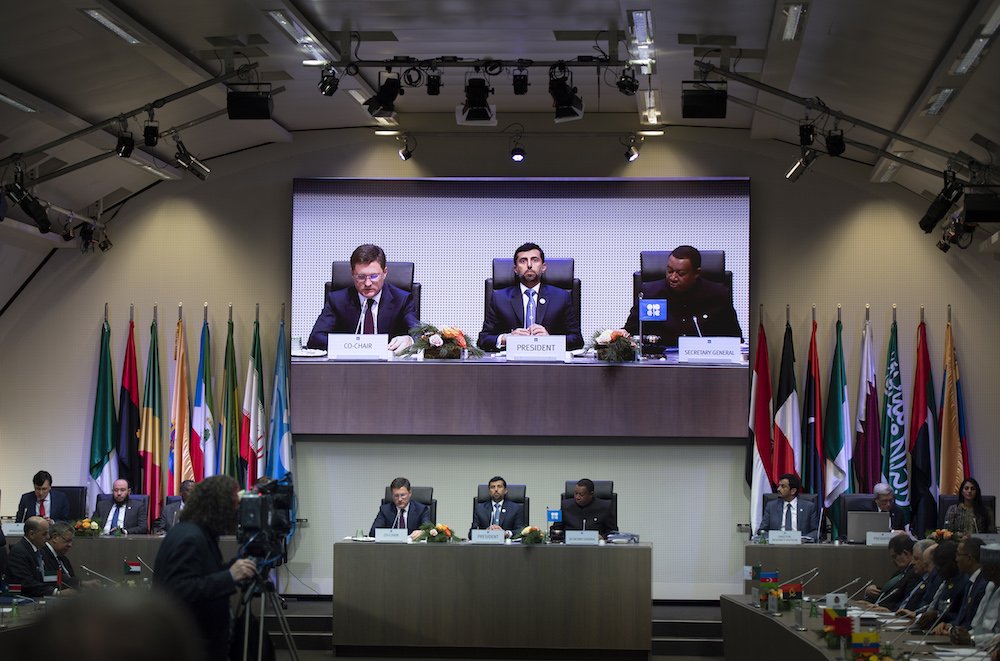
- ARAB NEWS
- 15 Jul 2025

The ritual had been the same since OPEC started its cooperation with 10 other oil-producing allies, led by Russia. OPEC+, as it became known, had managed to balance markets for more than three years, to the benefit of producers and consumers, both of whom need a clear planning horizon to make investment and operational decisions.
It went as follows: OPEC suggested cuts, Russia sat on the fence — and relented in the end. Last December Russia negotiated hard and was rewarded. While Moscow took part in the 2.1 million barrels per day (bpd) production cuts, it won when OPEC agreed to carve condensates out of the equation.
This time around things looked different: Saudi Arabia wanted to bring the March 5/6 meeting forward to mid-February in order to address the oil demand decline caused by the coronavirus outbreak. A recommended production cut of 600,000 bpd on top of the 2.1 million from December would have allowed OPEC+ to get ahead of the story. Alas, Russia insisted that the meeting take place as scheduled.
Markets did not like it and the price of a barrel of oil plunged from close to $70 at the beginning of January, when the assassination of Iranian military commander Qassem Soleimani triggered geopolitical fears, to $53.6 on Tuesday last week. The hope of an OPEC+ deal supported the price somewhat despite the possibility flagged by the International Energy Agency (IEA) of zero increase in demand this year because of the coronavirus.
So what happened last Friday in Vienna, when the supply pact fell apart? Why, this time, did Russia not yield?
The coronavirus has caused demand for oil to collapse. Worse, until we see how it plays out over the next few months, nobody can assess the full global economic impact of the outbreak. Already, manufacturing supply chains have ground to a halt and factories are shut, not just in East Asia but also beyond. International borders are closed, planes grounded, travel decimated, and large gatherings canceled. Sports fixtures normally attended by tens of thousands are being played in empty stadiums, and major events planned for this summer may not take place at all. Last week’sOPEC meeting itself was restricted; the press and analysts were not allowed into the building and ministerial delegations were kept to a minimum. OPEC’s Secretary General Mohammed Barkindo and Russia’s Energy Minister Alexander Novak replaced their usual hearty handshake with a foot greeting.
Here is what happened, how, and why.
For Russia, the cooperation with Saudi Arabia and the UAE under OPEC+ was valuable beyond oil.
Cornelia Meyer
The coronavirus situation had deteriorated so far that OPEC’s original production cut recommendation of 600,000 bpd rose to 1 million a week ago, and then to 1.5 million; Saudi Arabia would take the lion’s share and the UAE, Kuwait, Iraq and Russia would also contribute. In an unusual move, OPEC put out a strongly worded press release on the evening of March 5 recommending a 1.5 million bpd cut. Novak flew back to Moscow and returned to Vienna the following morning, by which time the decision not to play ball was firm.
For Russia, the cooperation with Saudi Arabia and the UAE under OPEC+ was valuable beyond oil. Moscow has become a force to contend with in the Middle East and cooperating with the leaders of the GCC was worthwhile, particularly as they stood on opposite sides in the war in Syria. The alliance also resulted in lucrative investment deals and other areas of cooperation.
There is more: Russia feels slighted by the West, the US in particular. It suffers under sanctions and is more than displeased with US opposition to Nord Stream 2, the pipeline that will bring Russian gas below the Baltic Sea to Germany. At the same time, US shale oil and gas production is a thorn in the side of both Novak and Putin. Competition is underway for market share and relative power.
While many may empathize with both Russia’s frustration and its unwillingness to take more pain in the form of production cuts, this is a dangerous game tried once before. In 2014, Saudi Arabia let the reins loose and everybody in OPEC produced full throttle. The oil price went into freefall. The aim had been to damage imminent shale operations in the US, which have higher production costs than the GCC. Yes, the US producers suffered in the short term, but they optimized production processes and came back with a vengeance. Something similar could happen again.
Meanwhile, there is uncertainty about the existing 2.1 million bpd production cuts, which are scheduled to end on March 31. Saudi Arabia said on Sunday it would increase production in April from 9.7 bpd to as much as 11 million bpd.
Many now question the future of OPEC. They are wrong. OPEC has been pronounced dead before, tens if not hundreds of times, and it has always persevered, with tweaks — sometimes even reinventing itself. There is validity for major oil producers with national oil companies to have a forum for discussion. The creation of OPEC+ proved that the leaders understood that the growing might of US shale production required revisiting the modus operandi.
Over time, oil will no doubt be replaced by other energy sources. Vision 2030 takes this into account by diversifying the Kingdom’s economy away from its dependence on hydrocarbons. However, the global economy will still need oil, especially as a fuel for transport. The IEA and OPEC both predict oil demand growth for as many two decades to come, even if the coronavirus outbreak puts a dent in the trajectory.
The existence of OPEC is in the interest of most major producers outside North America and Western Europe. There will always be backlashes, but nobody said the going would always be smooth.
Cornelia Meyer is a business consultant, macro-economist and energy expert. Twitter: @MeyerResources